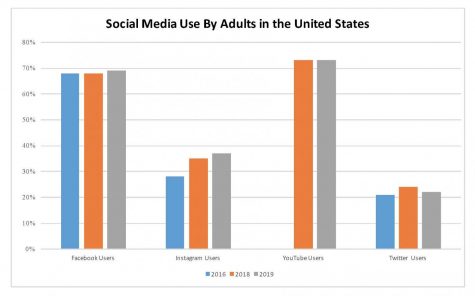Netflix’s “You”: A representation of social media users today
Statistics indicate that many victims of cyberstalking are unaware that they have a stalker at all. Data was collected from JDP, MSN, CBS 58, Violence Victims, the American Journal of Criminal Justice ( 2016, 2019), and J Interpers Violence.
February 13, 2020
Netflix’s millennial romantic thriller “You” has been soaring in popularity with fans, now tuning in for the show’s second season. Joe Goldberg, the show’s main character, is a hopeful romantic. The charming protagonist also turns out to be a serial killer and stalker.
Joe is able to stalk his love interest, Beck, through her social media accounts. Joe locates her address with ease using her Instagram. He finds her address by reverse searching a picture she posted of her apartment with Google Maps. The show’s audience may think that finding an address in that way is a stretch, however, tech-savvy students know that gleaning an address in this way is easily possible for many people.
“The Netflix drama ‘You’ was created with the intention of bringing awareness to the social media stalking epidemic,” psychology major Nora Alammari stated when explaining her interpretation of the series.
Social media is a tool many people use for stalking without even realizing it. People can use social media to see where you hang out, who you hang with, and when you are out of town. People share a lot of information on social media, and they often share too much.

With a growing portion of the United States adult population using social media, platforms like Instagram have continued to grow. Data collected from the Pew Research Center.
Consider a few of the potential risks of posting your every move, like Beck does. What if someone breaks into your apartment because they know that you are miles away on vacation based on the selfies you post? People often go as far as checking in at a particular town or restaurant on Facebook for everyone to see. Do you really want your hundreds of “friends” to know exactly where you are and when you are there? Joe is able to tell when the apartment is empty after seeing Beck’s posts, and eventually uses the knowledge to sneak in while she isn’t home.
Joe is unarguably an extremely obsessive character. Social media can easily incite obsessive behavior in users, just as viewers see in “You.” Joe and Beck’s relationship even begins with Joe secretly standing outside of Beck’s apartment watching her, having located her using information found on social media.
Just like Joe, people find themselves checking their person of interest’s social media religiously. A critical analysis of the show leads viewers to see that the drama is cleverly coined “You” because the writers of the show want viewers to understand that the viewers share characteristics with Joe.
Consider this: If you have ever gone through your significant other’s phone, then you are like Joe. If you have ever tried to isolate your significant other from friends you deem as “a bad influence,” so has Joe. If you have ever found yourself becoming jealous of your significant other for having
a great time without you, then you have felt just like Joe. If you ever feel like you know someone you have never met but followed on social media, so has Joe.
Although you are not Joe, it goes without saying that many people with a social media account share attributes with this killer cyber-stalker. Joe is extremely obsessive, serving as one example of how social media has influenced many people to become more obsessive than they would have been otherwise.
“Hello. Who are you? All your accounts are public. You want them to see you, to know you,” Joe assumed while looking at Beck’s social media during the first episode.
Despite what people may think, no one can know someone based solely on their social media footprint. Hopefully after watching “You,” students realize that it is probably best to make their accounts private. However, the ideal message one should glean from “You” is that social media is changing people.
Social media is making many people extremely obsessive. The theme of the show “You” emphasizes the growing concern that social media has the potential to change people’s behavior. Overindulgence in social media can lead people to act in a way that they normally would not, such as the millions of people obsessing over things outside their realm of control or business. Joe exemplifies how social media can distort a person and change their behaviors.
While viewers are not Joe, they likely share at least a few attributes with Joe. Viewers should consider taking a step back to think about just how impactful social media is on their behavior and thought process.
If you are experiencing this or any other type of relationship abuse, CSU Bakersfield has resources to help. Olivia Warren is one of CSUB’s campus advocates against violence. Her job is to help students who are being abused. If you are seeing warning signs from your partner, you can talk to her and she can provide confidential expert advice.
Warren aids in obtaining restraining orders, and can place students who are facing abuse into emergency housing. She helps students navigate programs through social services in order to receive benefits, enabling them to become independent. Warren will accompany you to court, police investigations, and medical appointments, ensuring that you never have to face these hardships alone. Her office is located in the old dorms and she can be reached at (661) 654-6210.









Martin Goodnews • Nov 29, 2022 at 9:12 am
I am extremely impressed with your writing skills on Netflix as well as with the layout of your blog. And also this article is really useful and informative. I have a similar blog that best describes Netflix and lots more. It is very helpful and you won’t want to miss out.
Tecreals. com